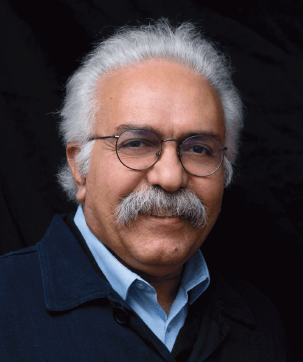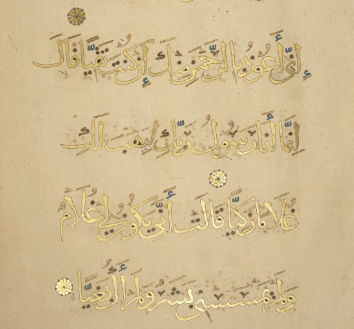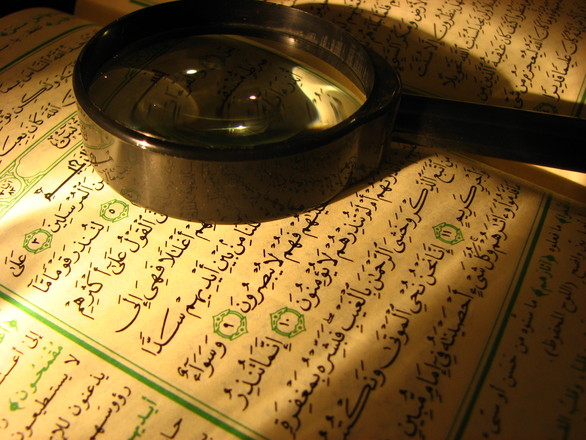
A very large portion of modern studies and researches related to Islam and the Qur’ān depend on methodologies, rules, mechanisms and tools of scientific research hailing from the West. They are not Muslim tools, and many Muslims in general may lack an opportunity to easily evaluate them. I have therefore decided in this series to present, in the simplest style possible, a summary of their content in the Arabic language, hoping that this very modest effort will prove useful to some.
BY JADOU JIBRIL
WHAT IS TRULY heartbreaking is that the major questions and problems related to our religion and our Holy Book often tumble upon us from the West. The ultimate hope of this series is to revive in the Arab mentality the culture of questioning and inquiry, after it has become hidden and then extinguished for centuries, resulting in a calcified mentality that loses its composure whenever it discerns some intent to sideline the Islamic narrative and its heritage, even for a moment.
What if the Qur’ān was written by many hands?
According to Islam, the Qur’ān is the divine word entrusted directly in Arabic to Muḥammad by the angel Gabriel. But scholars are moving away from this traditional view of things, and modern research has actually gone in the opposite direction, with many considering the Qur’ān to be the product of writing, composing, codifying, re-writing – the labour of many editors.
The ancient Islamic narrative is very clear on this point: the Qur’ān is the unchangeable word of God, spoken in clear Arabic,[1] sent down from heaven to Muḥammad, who was tasked with reciting it by the angel Gabriel. As for its final written version, we owe this to the initiative of ‘Uthmān, the third caliph of Islam, who brought everyone into agreement on the literal meaning of the text.
Many are considering the Qur’ān to be the product of many editors
However, many scholars and historians are skeptical of this overly formal and fixed picture. These academics have one thing in common. Beyond the occasional differences that separate their analyses, they call for a better knowledge of the Islamic Holy Book. They support the idea that the Qur’ān was the product of work spanning several decades and was undoubtedly completed in the last years of the seventh century. For these scholars it was not merely written, copied, and transcribed by human hands[2] but was written down over time from the pens of many.
The first stage
If believers and historians seem to speak a different language, Anne-Sylvie Boisliveau, author of the book Le Coran par lui-même[3] recalls that Islam itself recognizes that its writings are also a matter of composition:
The Islamic tradition, like many scholars, divides the sūras between Makkan and Madinan. In this view, there is also the possibility that the entire sūra is entirely Meccan, with a Medinan verse added later.
The sūras are called ‘Makkan’ or ‘Madinan’ because they are known to have been received and recited by Muḥammad while he was in Makka and then in Madina, respectively. However, as the researcher continues, this type of inclusion is merely a first step:
In the Islamic tradition, when we talk about Madinan verses in a Makkan sūra, there is already the idea of rewriting the sūras several times. But in the Islamic tradition, it is necessarily linked to Muḥammad who was the one who determined the exact location and position of the verse in the Qur’ān, even though most traditions acknowledge that the complete codification of the Qur’ān was carried out after his death.
But the discussion goes much further. This ‘work in progress’ continued long after the Arabs had passed beyond the horizons of Makka or Madina. Mohamed Ali Amir Moezzi[4] who supervised the compiling of the Dictionnaire du Coran and co-directed the Controverses sur les Écritures canoniques de l’islam, explains that even before raising the issue of the plurality of Qur’ānic authors, it should be noted that for a very long time different Qur’āns competed for the attention of Muslims:
The official version that we know was probably developed very early, that is, at the end of the first century AH (seventh century AD), under the caliphate of Abd al-Malik, the Umayyad.
But not everyone accepted this version. Other versions spread, and in the fourth century AH everyone came to accept the official version. But there were at least three or four other Qur’ānic versions, he points out,
depending on the doctrines, political trends, cities and regions, people chose this or that revision.
We are not talking here about a misplaced comma or a difference between vowels. Muḥammad Ali Amir Moezzi points out that the Qur’ānic version of Ubayy ibn Ka‘b, one of the Companions of the Prophet of Islam, included two sūras that do not appear in the current Qur’ān.
Islam itself recognizes that its writings are also a matter of composition
Overseeing the transitions
The version of the Qur’ān that has managed to establish itself to the point that it is now unique, makes it questionable. As Mohammad Ali Amir Moezzi asks:
The Qur’ān presents itself as an extension of the Torah of Moses and the Gospel, so why is it so fragmented and disorganized? Why, for example, in the stories of the prophets of the Bible, do we have the beginning at the end of the Qur’ān, the end at the beginning? It is as if it was cut into parts and then arranged in this way arbitrarily. Why is there no logical narrative?
This specialist in Shi‘a Islam echoes the doubts of the Shiite ancestors regarding this ‘authoritative’ Qur’ān:
The second anomaly is the Shiite ancestors’ belief in there having been some omissions from the Qur’ānic text in the context of internal cohesion. Guillaume Dye[5] also studied the sūras closely. He discovered in these some signs of a great deal of development. In an article Controverses sur les Écritures canoniques de l’islam, he says that he sees, through his research, signs of the special care taken in the formulation of the text: “What is strange is the relative congruence of the decreasing length of the sūras in the Qur’ān and their sequence. We can assume some editorial work to ease the transition from one sūra to another. At first we had isolated texts so that we may assume that the editor wanted to facilitate the transition from one to the other”.
Thus we enter into the heart of the rewriting process and the gradual transformation of the sacralised verses. Guillaume Dye has devoted himself to the study of interpolations, that is, the addition of a word, a proposition or a line to a text already existing in the sūras of the Qur’ān. Providing examples supporting his statements, he distinguishes four motives lying behind these modifications, motives that occasionally appear in the Qur’ān. A first case is where they intervene when the early versions of the Qur’ān find themselves in disagreement with some critiques. An example is the rewriting of the story of Mary between sūra 3 (sūrat Āl ‘Imrān) and sūra 19 (sūrat Maryam).
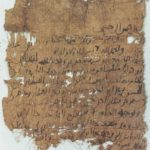
Suggested Reading
The first case: Rewriting the story of Mary between sūras 3 and 19
Sūrat Āl ‘Imrān (verses 34-60)
They were descendants one of another. Allah is Hearer, Knower. (Remember) when the wife of ‘Imran said: My Lord! I have vowed unto Thee that which is in my belly as a consecrated (offering). Accept it from me. Lo! Thou, only Thou, art the Hearer, the Knower! And when she was delivered she said: My Lord! Lo! I am delivered of a female – Allah knew best of what she was delivered – the male is not as the female; and lo! I have named her Mary, and lo! I crave Thy protection for her and for her offspring from Satan the outcast.
And her Lord accepted her with full acceptance and vouchsafed to her a goodly growth; and made Zachariah her guardian. Whenever Zachariah went into the sanctuary where she was, he found that she had food. He said: O Mary! Whence cometh unto thee this (food)? She answered: It is from Allah. Allah giveth without stint to whom He will. Then Zachariah prayed unto his Lord and said: My Lord! Bestow upon me of Thy bounty goodly offspring. Lo! Thou art the Hearer of Prayer. And the angels called to him as he stood praying in the sanctuary: Allah giveth thee glad tidings of (a son whose name is) John, (who cometh) to confirm a word from Allah lordly, chaste, a prophet of the righteous. He said: My Lord! How can I have a son when age hath overtaken me already and my wife is barren? (The angel) answered: So (it will be). Allah doeth what He will. He said: My Lord! Appoint a token for me. (The angel) said: The token unto thee (shall be) that thou shalt not speak unto mankind three days except by signs. Remember thy Lord much, and praise (Him) in the early hours of night and morning. And when the angels said: O Mary! Lo! Allah hath chosen thee and made thee pure, and hath preferred thee above (all) the women of creation. O Mary! Be obedient to thy Lord, prostrate thyself and bow with those who bow (in worship).
This is of the tidings of things hidden. We reveal it unto thee (Muḥammad ). Thou wast not present with them when they threw their pens (to know) which of them should be the guardian of Mary, nor wast thou present with them when they quarrelled (thereupon). (And remember) when the angels said: O Mary! Lo! Allah giveth thee glad tidings of a word from him, whose name is the Messiah, Jesus, son of Mary, illustrious in the world and the Hereafter, and one of those brought near (unto Allah). He will speak unto mankind in his cradle and in his manhood, and he is of the righteous. She said: My Lord! How can I have a child when no mortal hath touched me? He said: So (it will be).
Allah createth what He will. If He decreeth a thing, He saith unto it only: Be! and it is. And He will teach him the Scripture and wisdom, and the Torah and the Gospel, And will make him a messenger unto the Children of Israel, (saying): Lo! I come unto you with a sign from your Lord. Lo! I fashion for you out of clay the likeness of a bird, and I breathe into it and it is a bird, by Allah’s leave. I heal him who was born blind, and the leper, and I raise the dead, by Allah’s leave. And I announce unto you what ye eat and what ye store up in your houses. Lo! herein verily is a portent for you, if ye are to be believers. [And (I come) confirming that which was before me of the Torah, and to make lawful some of that which was forbidden unto you. I come unto you with a sign from your Lord, so keep your duty to Allah and obey me.] Lo! Allah is my Lord and your Lord, so worship Him. That is a straight path.
But when Jesus became conscious of their disbelief, he cried: Who will be my helpers in the cause of Allah? The disciples said: We will be Allah’s helpers. We believe in Allah, and bear thou witness that we have surrendered (unto Him). Our Lord! We believe in that which Thou hast revealed and we follow him whom Thou hast sent. Enrol us among those who witness (to the truth). And they (the disbelievers) schemed, and Allah schemed (against them): and Allah is the best of schemers. (And remember) when Allah said: O Jesus! Lo! I am gathering thee and causing thee to ascend unto Me, and am cleansing thee of those who disbelieve and am setting those who follow thee above those who disbelieve until the Day of Resurrection. Then unto Me ye will (all) return, and I shall judge between you as to that wherein ye used to differ.
As for those who disbelieve I shall chastise them with a heavy chastisement in the world and the Hereafter; and they will have no helpers. And as for those who believe and do good works, He will pay them their wages in full. Allah loveth not wrong-doers. This (which) We recite unto thee is a revelation and a wise reminder. Lo! the likeness of Jesus with Allah is as the likeness of Adam. He created him of dust, then He said unto him: Be! and he is. (This is) the truth from thy Lord (O Muḥammad ), so be not thou of those who waver.
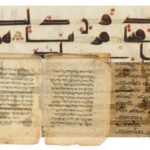
Suggested Reading
Sūrat Maryam (verses 1-98)
Kaf. Ha. Ya. A’in. Sad. A mention of the mercy of thy Lord unto His servant Zachariah. When he cried unto his Lord a cry in secret, Saying: My Lord! Lo! the bones of me wax feeble and my head is shining with grey hair, and I have never been unblest in prayer to Thee, my Lord. Lo! I fear my kinsfolk after me, since my wife is barren. Oh, give me from Thy presence a successor Who shall inherit of me and inherit (also) of the house of Jacob. And make him, my Lord, acceptable (unto Thee). (It was said unto him): O Zachariah! Lo! We bring thee tidings of a son whose name is John; we have given the same name to none before (him). He said: My Lord! How can I have a son when my wife is barren and I have reached infirm old age? He said: So (it will be). Thy Lord saith: It is easy for Me, even as I created thee before, when thou wast naught. He said: My Lord! Appoint for me some token. He said: Thy token is that thou, with no bodily defect, shalt not speak unto mankind three nights.
Then he came forth unto his people from the sanctuary, and signified to them: Glorify your Lord at break of day and fall of night. (And it was said unto his son): O John! Hold fast the Scripture. And we gave him wisdom when a child, And compassion from Our presence, and purity; and he was devout, And dutiful toward his parents. And he was not arrogant, rebellious. Peace on him the day he was born, and the day he dieth and the day he shall be raised alive! And make mention of Mary in the Scripture, when she had withdrawn from her people to a chamber looking East, And had chosen seclusion from them.
Then We sent unto her Our Spirit and it assumed for her the likeness of a perfect man. She said: Lo! I seek refuge in the Beneficent One from thee, if thou art Allah-fearing. He said: I am only a messenger of thy Lord, that I may bestow on thee a faultless son. She said: How can I have a son when no mortal hath touched me, neither have I been unchaste? He said: So (it will be). Thy Lord saith: It is easy for Me. And (it will be) that We may make of him a revelation for mankind and a mercy from Us, and it is a thing ordained.
And she conceived him, and she withdrew with him to a far place. And the pangs of childbirth drove her unto the trunk of the palm-tree. She said: Oh, would that I had died ere this and had become a thing of naught, forgotten! Then (one) cried unto her from below her, saying: Grieve not! Thy Lord hath placed a rivulet beneath thee, And shake the trunk of the palm-tree toward thee, thou wilt cause ripe dates to fall upon thee. So eat and drink and be consoled. And if thou meetest any mortal, say: Lo! I have vowed a fast unto the Beneficent, and may not speak this day to any mortal.
Then she brought him to her own folk, carrying him. They said: O Mary! Thou hast come with an amazing thing. O sister of Aaron! Thy father was not a wicked man nor was thy mother a harlot. Then she pointed to him. They said: How can we talk to one who is in the cradle, a young boy? He spake: Lo! I am the slave of Allah. He hath given me the Scripture and hath appointed me a Prophet, And hath made me blessed wheresoever I may be, and hath enjoined upon me prayer and almsgiving so long as I remain alive, And (hath made me) dutiful toward her who bore me, and hath not made me arrogant, unblest. Peace on me the day I was born, and the day I die, and the day I shall be raised alive! Such was Jesus, son of Mary: (this is) a statement of the truth concerning which they doubt. It befitteth not (the Majesty of) Allah that He should take unto Himself a son.
Glory be to Him! When He decreeth a thing, He saith unto it only: Be! and it is. And lo! Allah is my Lord and your Lord. So serve Him. That is the right path. The sects among them differ: but woe unto the disbelievers from the meeting of an awful Day. See and hear them on the Day they come unto Us! yet the evil-doers are to-day in error manifest. And warn them of the Day of anguish when the case hath been decided. Now they are in a state of carelessness, and they believe not. Lo! We, only We, inherit the earth and all who are thereon, and unto Us they are returned. And make mention (O Muḥammad ) in the Scripture of Abraham. Lo! he was a saint, a prophet. When he said unto his father: O my father! Why worshippest thou that which heareth not nor seeth, nor can in aught avail thee? O my father! Lo! there hath come unto me of knowledge that which came not unto thee.
So follow me, and I will lead thee on a right path. O my father! Serve not the devil. Lo! the devil is a rebel unto the Beneficent. O my father! Lo! I fear lest a punishment from the Beneficent overtake thee so that thou become a comrade of the devil. He said: Rejectest thou my gods, O Abraham? If thou cease not, I shall surely stone thee. Depart from me a long while! He said: Peace be unto thee! I shall ask forgiveness of my Lord for thee. Lo! He was ever gracious unto me. I shall withdraw from you and that unto which ye pray beside Allah, and I shall pray unto my Lord. It may be that, in prayer unto my Lord, I shall not be unblest.
So, when he had withdrawn from them and that which they were worshipping beside Allah, We gave him Isaac and Jacob. Each of them We made a prophet. And we gave them of Our mercy, and assigned to them a high and true renown. And make mention in the Scripture of Moses. Lo! he was chosen, and he was a messenger (of Allah), a prophet. We called him from the right slope of the Mount, and brought him nigh in communion. And We bestowed upon him of Our mercy his brother Aaron, a prophet (likewise). And make mention in the Scripture of Ishmael. Lo! he was a keeper of his promise, and he was a messenger (of Allah), a prophet. He enjoined upon his people worship and almsgiving, and was acceptable in the sight of his Lord.
And make mention in the Scripture of Idris. Lo! he was a saint, a prophet; And We raised him to high station. These are they unto whom Allah showed favour from among the prophets, of the seed of Adam and of those whom We carried (in the ship) with Noah, and of the seed of Abraham and Israel, and from among those whom We guided and chose. When the revelations of the Beneficent were recited unto them, they fell down, adoring and weeping. Now there hath succeeded them a later generation whom have ruined worship and have followed lusts. But they will meet deception. Save him who shall repent and believe and do right. Such will enter the Garden, and they will not be wronged in aught – Gardens of Eden, which the Beneficent hath promised to His slaves in the unseen. Lo! His promise is ever sure of fulfilment – They hear therein no idle talk, but only Peace; and therein they have food for morn and evening.
Such is the Garden which We cause the devout among Our bondmen to inherit. We (angels) come not down save by commandment of thy Lord. Unto Him belongeth all that is before us and all that is behind us and all that is between those two, and thy Lord was never forgetful – Lord of the heavens and the earth and all that is between them! Therefor, worship thou Him and be thou steadfast in His service. Knowest thou one that can be named along with Him? And man saith: When I am dead, shall I forsooth be brought forth alive? Doth not man remember that We created him before, when he was naught? And, by thy Lord, verily We shall assemble them and the devils, then We shall bring them, crouching, around hell. Then We shall pluck out from every sect whichever of them was most stubborn in rebellion to the Beneficent. And surely We are Best Aware of those most worthy to be burned therein. There is not one of you but shall approach it. That is a fixed ordinance of thy Lord.
Then We shall rescue those who kept from evil, and leave the evil-doers crouching there. And when Our clear revelations are recited unto them, those who disbelieve say unto those who believe: Which of the two parties (yours or ours) is better in position, and more imposing as an army? How many a generation have We destroyed before them, who were more imposing in respect of gear and outward seeming! Say: As for him who is in error, the Beneficent will verily prolong his span of life until, when they behold that which they were promised, whether it be punishment (in the world), or the Hour (of doom), they will know who is worse in position and who is weaker as an army.
Allah increaseth in right guidance those who walk aright, and the good deeds which endure are better in thy Lord’s sight for reward, and better for resort. Hast thou seen him who disbelieveth in Our revelations and saith: Assuredly I shall be given wealth and children? Hath he perused the Unseen, or hath he made a pact with the Beneficent? Nay, but We shall record that which he saith and prolong for him a span of torment. And We shall inherit from him that whereof he spake, and he will come unto Us, alone (without his wealth and children).
And they have chosen (other) gods beside Allah that they may be a power for them. Nay, but they will deny their worship of them, and become opponents unto them. Seest thou not that We have set the devils on the disbelievers to confound them with confusion? So make no haste against them (O Muḥammad ). We do but number unto them a sum (of days). On the day when We shall gather the righteous unto the Beneficent, a goodly company. And drive the guilty unto hell, a weary herd, They will have no power of intercession, save him who hath made a covenant with his Lord. And they say: The Beneficent hath taken unto Himself a son. Assuredly ye utter a disastrous thing Whereby almost the heavens are torn, and the earth is split asunder and the mountains fall in ruins, That ye ascribe unto the Beneficent a son, When it is not meet for (the Majesty of) the Beneficent that He should choose a son.
There is none in the heavens and the earth but cometh unto the Beneficent as a slave. Verily He knoweth them and numbereth them with (right) numbering. And each one of them will come unto Him on the Day of Resurrection, alone. Lo! those who believe and do good works, the Beneficent will appoint for them love. And We make (this Scripture) easy in thy tongue, (O Muḥammad ) only that thou mayst bear good tidings therewith unto those who ward off (evil), and warn therewith the froward folk. And how many a generation before them have We destroyed! Canst thou (Muḥammad ) see a single man of them, or hear from them the slightest sound?
(The analysis continues here)
[1] This is clear Arabic speech. [Qur’ān XVI (al-Naḥl), 103; And We did not send any messenger but with the language of his people, so that he might explain to them clearly [Qur’ān XIV (Ibrāhīm), 4].
[2] This is what makes the Qur’ān a human work that may be subject to criticism.
[3] Anne-Sylvie Boisliveau’s article is partly taken from the thesis she defended at Aix-Marseille University (2010), under the supervision of Denis Grey. The researcher proposes to complement “existing studies on the Qur’ān” by “an examination of the self-referential Qur’ānic discourse” in the continuity of existing works (see, among others, D. Madigan, The Self-Image of the Qur’ān: Writing and Authority in the Islamic Scriptures, 2001). But what does “the study of Qur’ānic self-referentiality” (p. 11) mean? For the researcher, it is a matter of understanding the way the Qur’ān speaks about itself, of understanding the image that the text wants to “give to its readers or listeners”.
(Editorial note: Works on self-referentiality are available in the Almuslih Library: see Nicolai Sinai: Qurʾānic Self-Referentiality as a Strategy of Self-Authorization). See also, in the Almuslih Library: Boisliveau, A-S: Canonisation du Coran… par le Coran ? (‘Canonization of the Qur’ân… by the Qur’ân?’), and Boisliveau, A-S: Polemics in the Koran. The Koran’s Negative Argumentation over its Own Origin.
[4] Mohammad Ali Amir Moezzi, Iranian-French, born in 1956, academic, historian, researcher in Islamic studies, specializing in Shiism. He holds a state doctorate in Islamic studies, Sorbonne Nouvelle University, and holds the position of Director of Studies in Classical Islam at the École Pratique des Hautes Études, a post previously held by Louis Massignon, Henri Corbin and Daniel Gimaret. His publications include Dictionnaire du Coran 2007, Controverses sur les Écritures canoniques de l’islam 2014, Shiite Esotericism, Its Roots and Extensions, 2016, Le Coran des historiens 2021, History of the Qur’ān, Context, Origin, 2022.
[5] French orientalist, researcher in Islamic studies and professor at the Free University of Brussels. His publications include Heresies: The Construction of Religious Identities, with Christian Brouwer and Anja Van Rompaey. Biblical Figures in Islam, with Fabien Nobilio, 2014.
(Editorial note: See the above work in the Almuslih Library: Dye, G: Pourquoi et comment se fait un texte canonique? (Reflections on the history of the Qur’ān) Hérésies, 2015, pp 55-104., See also, in the Almuslih Library, the following works by the same author: Dye, G: لَيْلَةُ القَدْر هيَ أم ليلة الميلاد؟ (La Nuit du Destin et la Nuit de la Nativité, in Guillaume Dye & Fabien Nobilio, Figures bibliques en Islam, in The Study of Islamic Origins: New Perspectives and Contexts and The Qur’ān and its Hypertextuality in Light of Redaction Criticism.)
